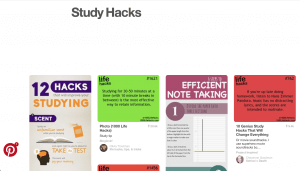73 Of Our Favorite Pinterest Study Hacks

Favorite Pinterest Study Hacks No. 1. Spray an unfamiliar scent while you’re studying and again right as you’re about to take the test. The scent will jog your memory. Also consider chewing a weird or unfamiliar flavor of gum. Works the same way.
2. Before taking a test write down all the relevant information you can remember on an index card as if it were a piece of paper you were allowed to bring with you.
3. Studying for 30-50 minutes at a time with 10 minute breaks in between is the most effective way to retain information.
4. You’re 50 percent more likely to remember something if you speak it out loud instead of simply reading it over and over to yourself.
5. If you’re up late doing homework, listen to Hans Zimmer Pandora. His music has no distracting lyrics, and the scores selected are intended to motivate.
6. If you need to focus better in a public place, go to SimplyNoise.com and play a selection of white noise that is scientifically developed to increase your concentration and focus.
7. If you’re struggling with a concept at school, google the subject with “site:.edu” and “type:.ppt.” This will give you PowerPoint presentations on the given subject from universities.
8. Study independently during these times since they are the levels where your brain function is at its best: 4 a.m. to 6 a.m., 6 a.m. to 7:30 a.m.
Favorite Pinterest Study Hacks No. 9. If struggling to remember a word, clinch your fists. This will increase brain activity and improve your memory.
10. Eating chocolate while studying will help the brain retain new information more easily and has been directly linked to higher test scores. No, seriously. http://www.mindblowing-facts.org/2013/01/eating-chocolate-before-studying-and-or-taking-tests-increases-your-chances-of-understanding-info-and-passing-with-a-high-grade/
11. Grapes will also improve your brain’s ability to process new information. But remember, that’s eating grapes, not drinking the fermented kind.
12. If having to write a long paper, use formulas to your advantage. In an 8-page paper, that will be roughly 16 paragraphs. Minus your intro and conclusion, you will need 14 body paragraphs. Write 14 ideas that support your thesis, rearrange them to make a natural thought process. Adjust the numbers based on the length of the paper you’re shooting for. 5 pages = 8 paragraphs (remember, that’s minus the intro and conclusion paragraphs); 10 pages = 18 paragraphs, 15 pages = 28 paragraphs, etc. Your finished product may have more or fewer paragraphs, but the act of breaking it up this way will allow you to have enough “meat” for a well thought out essay.
13. Once you are finished with an essay, listen to it aloud through Google Translate or read it to yourself. Any mistakes tend to jump out at you when you hear words verbalized rather than just reading them quickly on a screen. This is because your brain has a tendency to glide over mistakes and give you the benefit of the doubt when reading silently.
Favorite Pinterest Study Hacks No. 14. Writing something out is the memory equivalent of reading it seven times.
15. Write in blue ink rather than black; brain studies have shown students remember things better that way.
16. Use HemingwayApp.com to catch any mistakes for difficulty in readability, phrases written in passive voice, and adverb usage. It will also tell you how difficult your writing is to read. If you really want to go above and beyond the call of duty, run your revised work through a spellchecker after this and give it to a smart and trusted friend, who isn’t afraid to tell you whether your writing makes sense or needs more work.
17. Use scholar.google.com instead of ordinary google.com to find relevant information that will pass the authority sources test with your instructors.
18. Take a walk whenever you feel stumped by something.
19. Write down your biggest concerns before actually taking your exam. Studies have shown that it can improve test scores.
20. Read the first and last paragraphs of something first; then, skim through the middle.
21. Delivering a speech? Print the text out, and every four lines use a different highlighter color. It will make it much easier to find your place as you establish eye contact with the audience.
Favorite Pinterest Study Hacks No. 22. Study your notes within 24 hours of taking them.
23. Need to choose a topic for a paper? Pick something that angers you. This will keep you invested in the material and lead you to take great care with establishing your points of view.
24. Need to learn a new language? Consider purchasing a piece of software like Rosetta Stone — duh! — but then supplement that with the free Duolingo app on your smartphone, so you can get a little training in on the fly.
25. Mic drop test — if your conclusion doesn’t make you feel like you just dropped the mic on your topic, then it needs to be stronger.
26. Write down the sequence of your to-do tasks for the next 5 hours.
27. Focus on one task at a time.
28. Log out from all your social networks while you’re supposed to be working.
29. Drink water or coffee for your brain’s sake.
Favorite Pinterest Study Hacks No. 30. Clean your table/desk and your room to help create an environment more conducive to learning.
31. Teach your friends what you’re trying to learn. Encourage them to ask you questions. If you can teach it, you can master it.
32. Use programs that help you block out social media for a prescribed period of time whenever you need some distraction-free study time. SelfControl is one such app we would highly recommend. It will not even allow you to override the demand until the time period has lapsed. Just make sure you’re not “cheating” by using other devices (i.e. smartphones, tablets, etc.).
33. Wolframalpha.com — plug in any equation and it will give you the correct answer and show you how it got there. Also, PhotoMath! It lets you take pictures of math problems straight from whatever material you’re working on, and it’ll do the same thing.
34. Exam time? Go to Google and search “site:.edu [subject] exam.” This will pull college exams from the same course and provide one of the very best study guides around in the buildup to exam day.
35. Attend class, pay attention and take notes. Simple but often overlooked.
36. TLDR is a Google Chrome extension that summarizes longform articles. Highly recommended when trying to work quickly on a research paper.
Favorite Pinterest Study Hacks No. 37. Spend 2 to 5 minutes meditating before you start studying. This will clear your mind of stress.
38. Learn to treat your phone with the proper care. Keep it on silent (not vibrate), place it out of reach, and check it no more than once every hour.
39. Pay more visits to the library. The openness, the quiet, the environment conducive to learning, and the informational resources available will take you much further in your studies than you’re probably expecting.
40. Complete the most challenging or unpleasant task first. Accomplish this by first listing everything you need to accomplish for the day, then prioritizing them by the hardest first.
41. Find ways to reward yourself for the completion of an assignment. All work and no reward will cause you to hit burnout.
42. Organize your to-do list in three categories — action items, references, and the back burner.
43. When trying to wrap your brain around a complex word, don’t pay as much mind to the definition as you do to its synonyms. Connections have always worked better than rote memorization.
44. Don’t just take notes; ask questions. Asking questions gets you involved in the thick of things and it’s more likely to create a measurable impact over time.
45. Use recorders for lectures. Find one that allows you to bookmark important moments. Go back to those bookmarks and re-listen to them as you study. Consider transcribing them as well.
46. When writing a long paper, do a search for “ly” to find all the words that end in those letters. More often than not these are adverbs, and completely useless. Once you have found them all, resolve to rewrite them into sentences that turn these words into concrete descriptions or actions.
Favorite Pinterest Study Hacks No. 47. Use mind maps, either handwritten or software programs.
48. Read through the chapter the night before class lecture. This reading doesn’t have to be a detailed one, mind you, though it can’t hurt. Start by focusing on the headings and subheadings, then skim skim skim! This will prove a great primer and help you learn to ask the right questions.
49. Break things into smaller chunks based on how long you have to learn the material. For example, let’s say your textbook chapter is 80 pages long and you are going to be studying it for the next three weeks. That’s 15 days if you’re just reading on weekdays. Basic math will tell you it’s about 5 and 1/3 pages per day. But rather than rigidly stick to that, look at how material falls. Is the 5-1/3 mark right in the middle of a subhead section that ends at the end of page 6? Go ahead and finish out the reading for the day at six pages. Just try to make sure the average shakes out to that 5-1/3 mark. That way you’re not taking on too much, and you’re not falling behind.
50. Bookmark this: https://www.pinterest.com/pin/308918855662032631/
51. Stylize your notes. Instead of just racing through and jotting down every point you can think of on a sheet of paper, come back to the material and revamp them in a clean and even artistic way. The act of doing so will give you the ability to restructure and prioritize the material while recalling key parts of a given lecture.
52. If your audio program allows you to, replay lectures at a speed of 1.5. This is quick enough to shave noticeable time off the length of the recording but not so fast that you have trouble retaining the information that is covered. Some recommend doing it at double the speed, but we would advise starting with 1.5 and going up from there as you get used to the tempo switch.
53. Whenever possible, consume reading material on audio. While availability may be limited in terms of what you can get for scholarly audio materials, it’s improving all the time, and you can pretty much find any work of literature on audio at present.
Favorite Pinterest Study Hacks No. 54. Consider switching the fonts on electronic materials to something more challenging to read. This will allow you to hone in and really take your time rather than skimming over pertinent details.
55. Whenever possible, find a documentary or two on the subject that you are about to watch. None of the documentary may end up on the final testing materials, but these do great jobs of making palatable difficult to understand information. In much the same way that skimming a chapter is helpful to your overall understanding before class day, a documentary primes the pump for understanding.
56. Do not underestimate the importance of sleep. Stop buying into the lie that you operate just fine doing all-nighters and getting less than the optimal amount of sleep to function. Even if you have one or two successes, it will eventually catch up with you.
57. Use checklists to keep an effective overview on your progress.
58. Form study groups whenever possible. Just make sure you’re not bringing in the wrong people. Ideally you want individuals who will pull their share of the weight. It’s okay to be at different levels of knowledge and ability — in fact, it’s preferable — but people who are constantly not meeting the objectives the group assigned through a lack of effort will only cause resentment and knock the group off track. Not to get preachy or religious here, but there is an old parable called the “Parable of the Talents” that Jesus offered up in the New Testament. Three different men were given different “talents” — in the story, it’s a form of currency — and each did different things with it. Two reinvested their talents and grew them over a set period of time, while another buried his in the sand so that he wouldn’t lose what his Master had entrusted him with. When the Master returned, he was happy with the two who used their talents to create more wealth; but to the one who hid his talent in the sand, he was furious. The lesson here for a study group: as long as everyone is contributing what they can, everyone will benefit.
59. Go solo and don’t be afraid to be wrong. Some people are poor studiers because they’re terrified of being wrong about something. If they never try, they never have to deal with the disappointment that comes with finding out they don’t know how to do something. But eventually there will be an accounting. That’s why you have to spread your wings and fail from time to time. Try to work a hard math problem on your own or take a crack at that scientific equation. You may find out that you’re insufficient, but it will put you on the fast track to improving your overall understanding.
60. At the start of every semester, make a schedule of the important assignment, test, and project due dates. Get a bird’s eye view of what your instructor will expect from you. In doing so, you’ll begin to understand the overview of what will be covered during the week.
Favorite Pinterest Study Hacks No. 61. Don’t miss due dates. If something needs to be turned in, make sure that it happens no matter what.
62. Communicate with your teacher every chance that you get. Send emails, drop in during office hours, see them after class. Just make sure you’re not doing it just to do it. Have some legitimate inquiries they can help you with. You don’t want to be perceived as a suck-up.
63. Review the syllabus often.
64. When taking notes, do not try to write down everything the instructor says. Lean on your recorder for support and do more listening than writing. Let your notes be a summary of the units of material that your instructor is going over.
65. When pinpointing important points that your instructor is trying to make, look for repetition and rephrasing. If he or she is doing a lot of it, they’re trying to tell you, “What I’m saying now is important.” Gravitate to these things when planning for end of unit assessments.
66. Devote a minimum of one hour study time per weekday to each class. Taking 15 hours of college classes? That’s probably five individual classes worth three credit hours each. So, five classes, five hours per week, 25 hours of study time altogether. Divided up over a 7-day week, that would mean a little more than three hours per day of studying in addition to your time spent in class, however much that is.
Favorite Pinterest Study Hacks No. 67. Take care of you. Eat right, work out, and again, get some sleep!
68. Avoid time wasters like rereading just to reread and some of the others we’ve already mentioned — taking notes on everything, highlighting overkill, and rewriting for the sake of rewriting.
69. Flash cards. They’re an old standby but still insanely effective when it comes to organizing information.
70. Plagiarism guard! Instead of copying an essay you like word-for-word, pay attention to the bibliography of sources they use. This will greatly reduce the amount of time that you spend seeking out sources, and it will allow you to formulate something unique that passes any plagiarism checker while still relying on the foundational principles of the paper that you admire.
71. If your eyeballs start to pop out of your head from reading a computer screen all day, turn on the dictation feature and have your computer read the web page to you. This will allow you to get a little more comprehension juice out of your brain when you feel like you’ve hit a wall.
72. Use a sleep hack website like Sleep-Calculator.com to time your sleeping schedule so that you’re not waking up in the middle of REM sleep but at the end of the cycles. This is a way that you can cut back on the amount of sleep you get without harming your mind’s ability to comprehend.
Favorite Pinterest Study Hacks No. 73. Selecting B or C when you just don’t know — ideally you want to know the material on a test inside and out, but in case you’re running out of your time and foisted into a scenario where you have to make guesses, gravitate towards B and C responses. Yes, you’ll probably miss some but statistically, you have a better chance of getting some of the questions right than if you pick A, D, or E.
So there you have it, readers. Hopefully you will get something of use out of these 73 Pinterest study hacks. If that’s not enough for you, however, make sure that you check out the full list of 1,000 at this link, and be sure to share some of your favorite tips in the comments section below!








